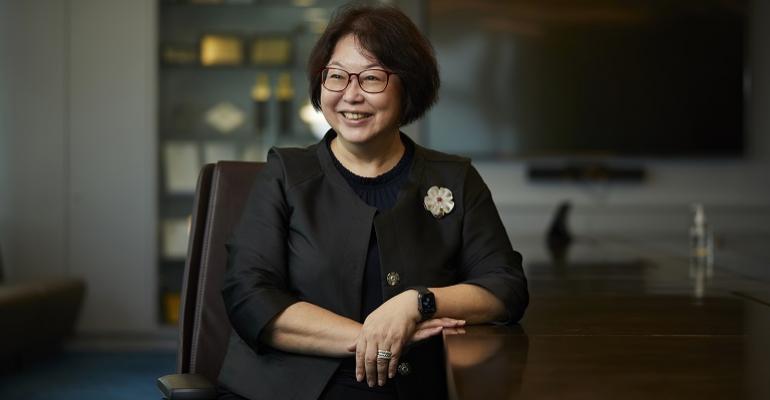As shipping embraces digitalisation and technology the fight for talent with other sectors is becoming ever greater, especially for an industry sometimes struggles with its image to the wider world.
One of the key roles of the Singapore Maritime Foundation (SMF) is promote careers in the maritime sector both to young people looking for their first job, and those who have decided they want to make a mid-career switch.
Coming into the Executive Director at SMF Tan Beng Tee brings with her a huge depth of knowledge of the maritime industries as an individual who has been instrumental in driving Singapore’s profile and role as an international maritime centre.
Speaking to Seatrade Maritime News about her role at SMF she says: “As the new Executive Director of the Singapore Maritime Foundation, helping talent—whether they be tertiary students, fresh graduates or mid-career professionals—gain a more nuanced understanding of the maritime ecosystem and the diverse opportunities it provides is one of my top priorities.”
As to what she believes makes maritime attractive as a career option, “A career in maritime has much to offer to jobseekers. The breadth of the industry provides a broad range of roles, and opportunities abound for individuals of diverse academic and professional disciplines.
“In recent years, transformation in Singapore’s maritime sector in particular is being spurred on by digitalization and decarbonisation, creating new roles that offer employees the chance to work at the frontier of technology and sustainability.”
In terms of younger job seekers at the start of their career Tan sees a growth in awareness of the opportunities that industry has to offer, although some misconceptions remain.
“A common misperception is that the maritime industry is male dominated. To that, I would say that the industry has made great headways to promote gender diversity. The Chief Executive of the Maritime and Port Authority of Singapore is female, as is the President of the Singapore Shipping Association. And there are many other examples of successful female maritime professionals in Singapore.”
In a sign that this misconception is being broken down the SMF’s MaritimeONE scholarships, of which an average of 39 have been awarded annually over the last three years, 2020 saw the highest number of female scholars since the scheme’s inception in 2007. It was also the third year that there were more female than male scholars.
Another misconception is the types of jobs available which go far beyond the perceived port and seafarering roles.
“The reality is that Singapore has, and continues to grow a well-rounded ecosystem of professional services such as legal, arbitration, finance, insurance, chartering, shipbroking and increasingly, technology and sustainability roles that support the maritime industry as a whole,” she says.
Helping connect people with these roles is the Maritime Singapore Connect (MSC) Portal that lists full-time roles as well as internships.
The MSC Portal also helps those looking to make a mid-career switch, and Tan believes that with the maritime sector needing new skills from outside the industry companies are open to applicants with a broad range of backgrounds.
“Maritime employers in Singapore welcome talent who are passionate about the industry and are self-motivated. And as the maritime industry continues to transform, skillsets in areas from diverse fields from technology to sustainability will be needed,” she explains.
“Depending on what job one is looking for, there may be some where a background in maritime will become less a pre-requisite and more on-the- job learning can fill the industry knowledge gap.”
Read about how Siti Nur Puteri Mohammad made the switch from bio-medical to shipbroking.
Looking specifically at technology and start-ups are an area where Singapore has made clear and ambition to the Silicon Valley of the maritime world and also sees pitching for talent in an area where competition is already fierce. The competition is something which Tan acknowledges and that the SMF is working closely with industry players on multiple fronts to attract tech talent.
“We must persevere to demonstrate that the maritime sector offers just as exciting opportunities in the area of technology,” she says.
“A new initiative which we are exploring is the Maritime Digital Case Challenge. We will bring technology challenges faced by industry players to tertiary students to solve, and get them to apply their technical knowledge to tackle these applied problems.
“The idea is to expose tertiary students to the digital transformation now underway in the maritime industry, and help them see how they can get in on the ground floor, apply their skills, and begin a fulfilling career. SMF will announce more details in due course.”
Copyright © 2024. All rights reserved. Seatrade, a trading name of Informa Markets (UK) Limited.
Add Seatrade Maritime News to your Google News feed.  |

